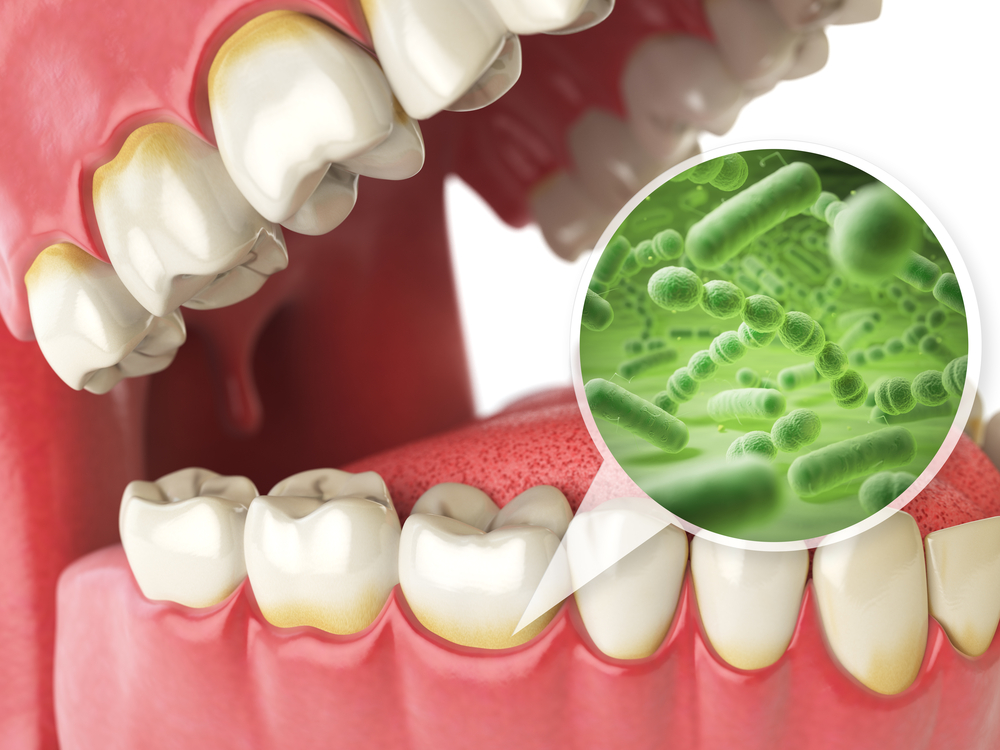Did you know that there are naturally-occurring bacteria that live in your mouth, helping you eat your food? Some bacteria are good and others definitely aren’t. Depending on how you eat and manage your oral healthcare there could very well be excess bacteria that needs to be removed through regular brushing, flossing, and dental cleanings.
To prevent bad bacteria from growing and causing dental issues like tooth decay, gum disease, and pericoronitis, we recommend that individuals visit our dental office in Keller, TX for regular dental cleanings and dental exams twice yearly. Dental exams allow Dr. Pickett to evaluate the health of your gums and teeth, while dental cleanings will remove any plaque and tartar buildup that can lead to more serious dental diseases. By removing dental plaque and tartar, you get rid of many of the bad bacteria that are built up in your mouth.

The 4 Types of Dental Cleanings
Depending upon the amount of plaque and tartar as well as your medical history, we’ll provide one of the following four types of dental cleanings:
- Prophylaxis Dental Cleaning – Prophylaxis means “to prevent disease”. So, a prophylaxis dental cleaning is used to clean healthy teeth in order to prevent tooth decay and gum disease. During these cleanings we remove plaque and tartar from the front, back, and sides of teeth using a dental scaler or water stream. This is the typical dental cleaning for most of our Keller, TX dental patients. Here are some reasons why someone would need a prophylaxis dental cleaning:
- To remove plaque and prevent tartar buildup: Plaque is a sticky film of bacteria that forms on the teeth and can lead to tooth decay and gum disease. Regular cleanings can help remove plaque and prevent tartar buildup, which is hardened plaque that can only be removed by a dental professional.
- To maintain good oral health: Regular dental cleanings can help maintain good oral health by preventing dental problems such as cavities and gum disease. By removing plaque and tartar, a prophylaxis cleaning can help reduce the risk of developing more serious dental issues down the line.
- To detect dental problems early: During a prophylaxis cleaning, a dental professional can examine your teeth and gums for signs of dental problems such as cavities, gum disease, or oral cancer. By detecting these problems early, they can be treated before they become more serious and potentially lead to tooth loss.
- To freshen breath: Plaque buildup can also cause bad breath. Regular cleanings can help remove this buildup and freshen your breath.
- Scaling and Root Planing Cleaning – The dental deep cleaning. During a scaling and root planing cleaning, we work to clean both the teeth and gum pockets to treat gingivitis and periodontitis. We’re extremely effective, but in serious cases, this may take multiple teeth cleanings to help the gums recover inbetween. Scaling allows us to remove plaque and tartar from both the tooth’s surface in the gum pockets and below the gum line caused by gum disease. This helps reduce gum inflammation as well as the bad bacteria that has built up over time. Root planing involves smoothing the tooth roots to help the gums reattach to teeth and remove the gum pockets entirely. Here are some reasons why someone would need an SRP cleaning:
- To treat gum disease: Gum disease, also known as periodontal disease, is a serious condition that can lead to tooth loss if left untreated. Scaling and root planing is often the first line of treatment for gum disease, as it can help remove the bacteria and calculus that contribute to the disease.
- To prevent gum disease from progressing: If left untreated, gum disease can progress and cause irreversible damage to the teeth and gums. Scaling and root planing can help prevent this from happening by removing the source of the infection and allowing the gums to heal.
- To reduce inflammation and pocket depth: Gum disease can cause inflammation and pockets to form between the teeth and gums. Scaling and root planing can help reduce inflammation and shrink the size of these pockets, which can help prevent further damage to the teeth and gums.
- To improve overall oral health: By removing bacteria and calculus from the teeth and gums, scaling and root planing can help improve overall oral health. It can also help prevent other dental problems, such as cavities and bad breath.
- To prepare for other dental procedures: Scaling and root planing may be necessary before certain dental procedures, such as dental implants or orthodontic treatment, to ensure that the teeth and gums are healthy and free of infection.
- Periodontal Maintenance Cleaning – These teeth cleanings are specifically targeting the treatment of gum disease. Similar to scaling and root planing, they remove excess plaque and tartar from the hard to reach places they shouldn’t be in. What sets it apart is that this cleaning focuses on gum disease treatment and getting you back into regular maintenance. Here are some reasons why someone would need a periodontal maintenance cleaning:
- To prevent gum disease from returning: Periodontal maintenance cleaning can help prevent gum disease from returning by removing bacteria and calculus that may have accumulated since the last cleaning. This is especially important for patients with a history of gum disease, as they are at a higher risk of developing the condition again.
- To monitor the progress of gum disease: Periodontal maintenance cleaning allows the dental professional to monitor the patient’s gum health and track the progress of the disease. This can help detect any signs of recurrence or further damage to the gums and teeth.
- To prevent tooth loss: Gum disease can lead to tooth loss if left untreated. Periodontal maintenance cleaning can help prevent this from happening by managing the condition and reducing the risk of further damage to the teeth and gums.
- To improve overall oral health: By removing bacteria and calculus from the teeth and gums, periodontal maintenance cleaning can help improve overall oral health. It can also help prevent other dental problems, such as cavities and bad breath.
- To maintain the results of previous treatment: Periodontal maintenance cleaning is necessary to maintain the results of previous gum disease treatments, such as scaling and root planing. It can help prevent the disease from recurring and maintain the health of the teeth and gums.
- Gross Debridement Cleaning – This is the most heavy-duty teeth cleaning designed to deal with extreme amounts of plaque and tartar buildup. This is for patients who struggle to maintain oral care routines or have been away from the dentist for too long. Tartar buildup at this point is extremely excessive and is much harder than plaque. Once this cleaning has been done, a prophylaxis cleaning is performed soon after to further clean the teeth. Here are some reasons why someone would need a gross debridement cleaning:
- To remove significant buildup of calculus and tartar: Gross debridement cleaning is necessary when the buildup of calculus and tartar on the teeth and gums is significant. This can occur when a patient has not had a cleaning in a long time or has a history of poor oral hygiene. The procedure involves the use of special tools to remove the buildup and restore the health of the teeth and gums.
- To prepare for other dental procedures: Gross debridement cleaning may be necessary before other dental procedures, such as orthodontic treatment or dental implants, to ensure that the teeth and gums are healthy and free of infection.
- To prevent gum disease: The buildup of calculus and tartar on the teeth and gums can contribute to the development of gum disease. Gross debridement cleaning can help prevent this from happening by removing the source of the infection and allowing the gums to heal.
- To improve overall oral health: By removing the buildup of calculus and tartar from the teeth and gums, gross debridement cleaning can help improve overall oral health. It can also help prevent other dental problems, such as cavities and bad breath.
- To detect dental problems: During gross debridement cleaning, a dental professional can examine the teeth and gums for signs of dental problems, such as cavities or gum disease. By detecting these problems early, they can be treated before they become more serious and potentially lead to tooth loss.
What Kind of Dental Cleaning Do You Need?
As you can tell, dental cleanings vary upon need and the amount of plaque and tartar buildup. Be sure to find out if you have gum disease or pericoronitis that could be causing additional problems and necessitate additional dental cleaning steps at your next visit.



